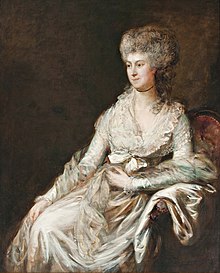Franziska Lebrun

Franziska Dorothea Lebrun-Danzi or Lebrun , b. Danzi (born March 24, 1756 in Mannheim , † May 14, 1791 in Berlin ), was a German opera singer ( soprano ) and composer .
Life
Franziska was the first child of the court musician Innocenz Danzi (around 1730–1798). Like her brother Franz Ignaz Danzi, she initially received singing lessons from her father, and she learned to compose from Georg Joseph Vogler . Later she probably received singing lessons from the prima donna of the court opera Dorothea Wendling (née Spurni), perhaps also from the tenor Pietro Sarselli , who was friends with the family. At the age of 16 she became a member of the Mannheim court orchestra and made her debut as Rosina in “L'amore artigiano” by Florian Leopold Gassmann in Schwetzingen , the summer residence of the Elector couple Karl Theodor and Elisabeth Auguste . In May 1778 she married her colleague Ludwig August Lebrun in London . With the relocation of the residence of Karl Theodors after the death of the Bavarian Elector Maximilian III. The young couple moved to Munich (→ Cuvilliés-Theater ) and Franziska Lebrun gave guest performances at various well-known opera houses in Europe.
The singer was enthusiastically celebrated in Milan , Paris , London , Vienna , Prague , Naples , Munich and Berlin. Particularly praised was the perfectly coordinated instrumental and vocal artistry of the Lebrun couple, to whom numerous composers paid tribute through arias with obbligato oboe , such as Ignaz Holzbauer in Günther von Schwarzburg (1777), Antonio Salieri in L'Europa riconosciuta (1778) or Georg Joseph Vogler in Castore e Polluce (1787). Musicologist Charles Burney wrote of the couple's performances:
"Franziska Danzi and the excellent oboist Lebrun usually travel together, and it seems as though she has listened to nothing other than his instrument, for when they perform together in thirds and sixths one cannot hear which is the upper or the lower voice!"
Franziska Lebrun was one of the few recognized female composers at a time when women were more likely to have a musical career as a singer or instrumental virtuoso. However, only a few of her works have survived, including some sonatas for violin and piano, which have now been made accessible to a wider audience through various editions and recordings.
After her husband's death in December 1790, she had two daughters to look after. To secure his livelihood, Karl Theodor continued to pay his celebrated prima donna of the court opera her salary of 1,500 guilders , contrary to the court music statutes . She could no longer take up her engagement at the royal opera in Berlin , which she received in 1790 . The singer died in May 1791, apparently she couldn't get over the death of her husband.
literature
- Joseph Kürschner : Lebrun, Franziska . In: Allgemeine Deutsche Biographie (ADB). Volume 18, Duncker & Humblot, Leipzig 1883, p. 102 f.
Web links
- Works by and about Franziska Lebrun in the catalog of the German National Library
- Franziska Lebrun-MUGI
Individual evidence
- ^ Württembergische Landesbibliothek: Klangwelten: Lebenswelten - Composers in Süddeutschland , Stuttgart (Status: February 2007) ( Memento from April 24, 2005 in the Internet Archive )
| personal data | |
|---|---|
| SURNAME | Lebrun, Franziska |
| ALTERNATIVE NAMES | Lebrun-Danzi, Franziska Dorothea (full name); Danzi, Franziska (maiden name) |
| BRIEF DESCRIPTION | German opera singer (soprano) and composer |
| DATE OF BIRTH | March 24, 1756 |
| PLACE OF BIRTH | Mannheim |
| DATE OF DEATH | May 14, 1791 |
| Place of death | Berlin |